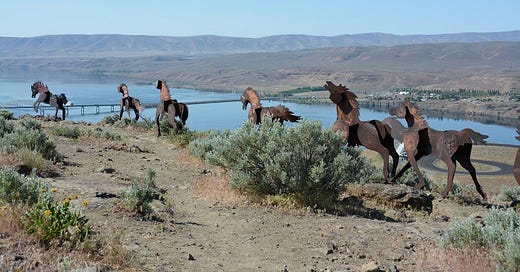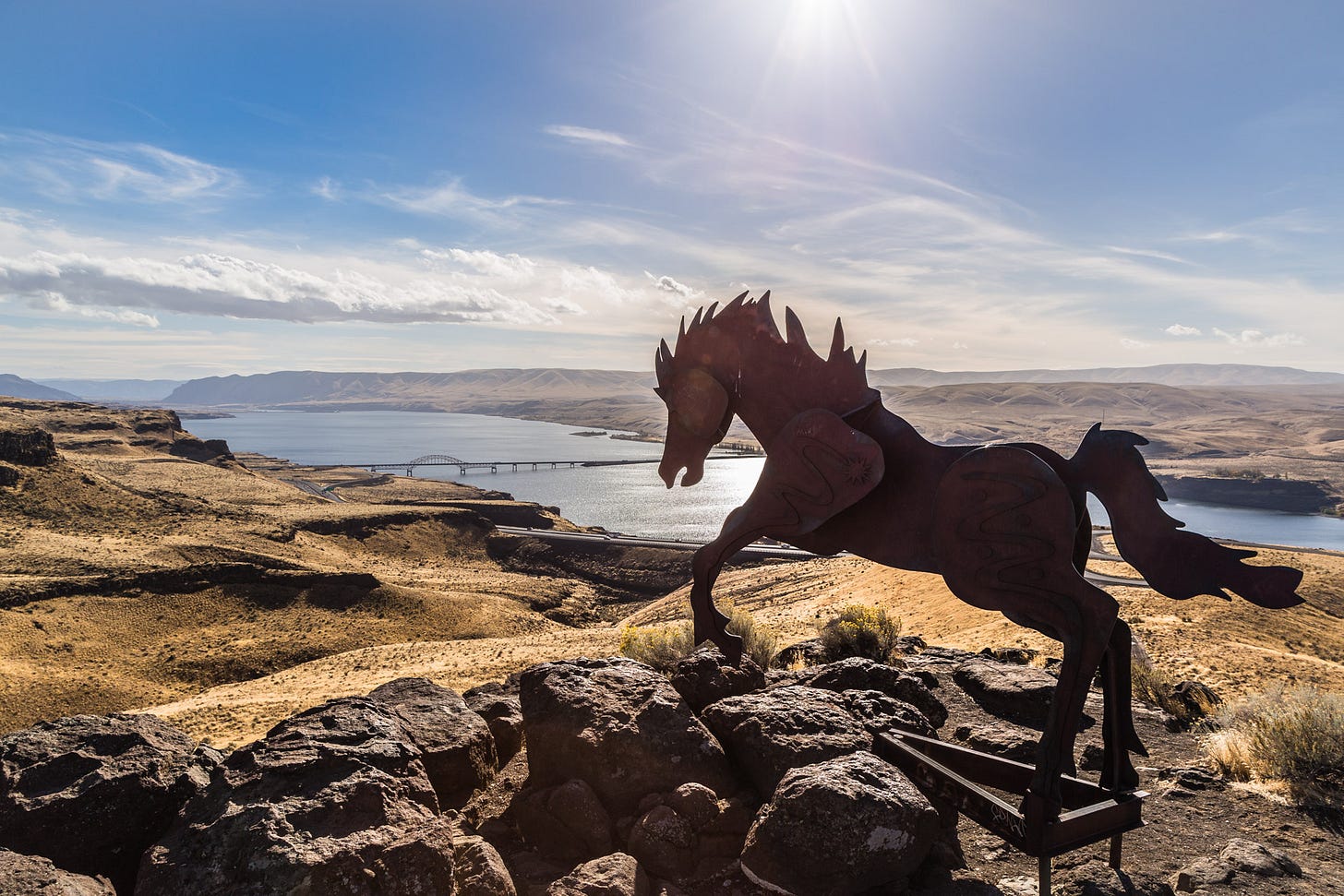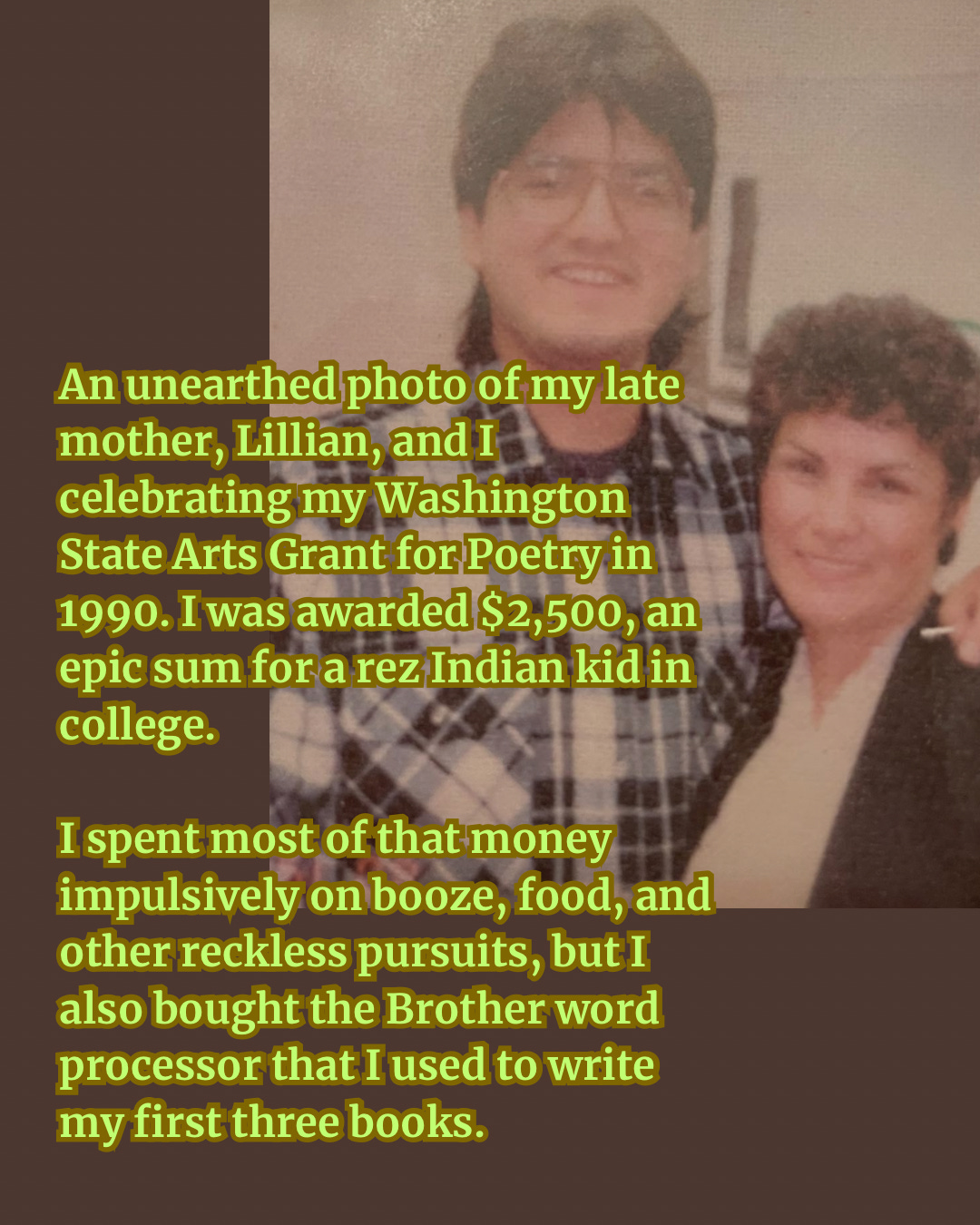Whenever Diane, my wife, and I drive over the 1-90 Vantage Bridge in Central Washington, I like to remind her of what she said when she first saw the Columbia: “Whoa, now that’s a river.” I didn’t know her yet when she first crossed over that bridge into her new life and new job in Spokane. So I didn’t hear her initial reaction to the Columbia. I wasn’t in the car. I was only The Theoretical Indian Guy She Hoped to Meet and Marry in Spokane, a Very Indian City with a Significant Number of Indian Dudes Who Might Be Marriage Material.
Diane first told me about her reaction to the Columbia when we drove over that great river for the first time together on our way to Seattle. She has only told me the story of her reaction once. But I repeat her story back to her every time that we cross the Vantage Bridge. I repeat it when we’re traveling east from Seattle and I repeat it when we’re traveling west from Spokane. I’ve repeated it many dozens of times. I’m the one who keeps turning that memory into something that must be said aloud.
I’m a romantic guy. I’m ceremonial. I’m obsessive. I’m a storyteller.
So, on this Mother’s Day weekend, on our way to Spokane, I again told Diane the story of how Lillian, my late mother, once parked her car and hiked up a steep hill to see the Wild Horses Monument sculptures overlooking the Columbia River and Vantage Bridge. Here’s photo from the Monument’s website to give you some idea of its beauty.
There are eighteen wild horse sculptures on the top of that hill. As originally envisioned, those horses were supposed to be running away from a 36-foot tall woven steel basket, but they ran out of money and have never finished. So now the horses, alone, seem to be motionless—nouns instead of verbs.
The official name of the monument is Grandfather Cuts Loose the Ponies but nobody calls it that.
The sculptures were installed in 1990 but I’m not sure when my mother climbed the hill to reach those horses. I can tell you that mother didn’t use the freeway exit to reach the parking lot and somewhat rough trail that leads up to the horses. She instead parked her car on the side of I-90—a rather dangerous decision—then stepped over a barbed wire fence and forged her own trail up the hill—a second dangerous decision.
My younger sisters, twins, waited in the car and watched my mother make her trek. I wasn’t there. They told me the story later.
“Did you try to stop her?” I asked.
They said, “No, she was in one of her moods.”
That’s something we often said during our lives with our mother.
She was in one of her moods.
I believe that my mother suffered from undiagnosed bipolar disorder. As defined by the National Institute of Mental Health, “bipolar disorder is a mental illness that causes clear shifts in a person’s mood, energy, activity levels, and concentration. People with bipolar disorder often experience periods of extremely ‘up,’ elated, irritable, or energized behavior (known as manic episodes) and very ‘down,’ sad, indifferent, or hopeless periods (known as depressive episodes).”
One of the most common symptoms of bipolar disorder is recklessness. A person in bipolar mania is prone to impulsive behavior involving money, drugs, alcohol, sex, and personal safety without regard to consequences.
So I believe that my mother was in bipolar mania when she parked her car dangerously close to interstate traffic and climbed a steep and feral hill on a hot summer day.
“There’s rattlesnakes all over there,” I said to my sisters as we laughed about our mother’s impulsive climb.
“We know,” my sisters said.
“How long did it take her to get up there?” I asked.
“A long time,” my sisters said. “And then she hiked back down.”
Oh, we laughed. What else could we do? We’ve been navigating our mother’s mood episodes since our births. We’ve been laughing since we were Indian children living on a reservation. We were small and weak then. We’re stronger now. But laughter has always been our gun and bulletproof armor.
I’m 58 years old now and am living with diagnosed bipolar disorder. I was initially diagnosed as Bipolar 2, which involves less intense manic episodes called hypomania, but I’ve have since been rediagnosed as Bipolar 1, which means that my manic episodes and its resultant impulsivity, paranoia, and hallucinations are more severe.
As I like to joke, “I never thought I was Jesus. I just thought I knew what Jesus was thinking.”
I take a cocktail of medicines and engage in weekly Dialectic Behavior Therapy sessions with my therapist. She has taught me a variety of skills that help me anticipate and manage my mood episodes. But these skills would be far less helpful if I wasn’t also taking the meds that perform various chemistry tricks in my brain.
I know that many of you curse BIG PHARMA. I curse at BIG PHARMA, too, but I also thank them for inventing these powerful little pills. They keep closed the door to the attic of mania and the door to the basement of depression. But they don’t lock those doors. I have to stay vigilant. Those doors are sometimes ajar. I still have manic and depressive episodes. They’re far less intense but they could become unmanageable again.
So, yeah, my mother was a wild horse when she climbed up the hill to those other wild horses.
But she was not as motionless as them. She was not a noun. She was a verb. She was ten thousand adverbs. She was powerful and unpredictable. She could make the earth tremble.
She was the one who, in her manic periods, would sew quilts. She wouldn’t sleep. She’d make a king-sized quilt in just a few days. She sold those quilts to friends, family, and strangers to feed and shelter us.
And she was also the woman who would sleep for days on the living couch. She’d only rise to drink a Diet Pepsi and eat a handful of peanuts.
Everything can be a ceremony.
My mother created quilts. Her quilts were art. Her quilts told stories.
And here I am, a manic and depressed storyteller, making my own kind of quilts.
I am my mother’s son. I love her. I miss her. I wish her a Happy Mother’s Day.








As I like to joke, “I never thought I was Jesus. I just thought I knew what Jesus was thinking.” Your pathos and humor slay me every time. Grateful to hear of Lillian's fierce love and spirit, the gifts that she brought, and the gifts your bring from your heart to our ears, too.
Thank you, Mr. Sherman Alexie. Thank you for writing of your mother and your family. My mother is nearly 90, confused, says little, but she's still here in amongst the weeds of family interactions and my dad's insistence on his rightness.
He's somewhat flexible with her. We are like logs in the river, colliding in the rapids and waterfalls.
When it's quiet, and just mom and me, she offerse things before I go, just as her mother did with her. I thought of it as treasures giving, as Potlatch, the town where my great-grandparents lived. Sometimes I decline.
"I gave that to you. I have one like it already. Don't give away any more quilts, or company won't have any left to sleep under." She seems surprised.
We walk through their house that dad built. She offers any of her paintings, saying, "I want these to go to people who know me. I want to be remembered."
No worries, mom.
This weekend, my son drove to Entiat to pick them up, take them to his house near Puget Sound for several days. We all watched his daughter's soccer game, as my parents watched, wrapped in warm flannel quilts I made for them. Wrapped in love, consternation, demands, and remembrance. Love is complicated.
Happy Mother's Day, mom. Love you!